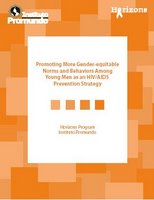
Group education can improve attitudes towards gender norms and reduce the risk of HIV
By: Pulerwitz J, Barker G, Segundo M & Nascimento M
Published by: Horizons , 2006
Via: Eldis
This report, produced by the Horizons Project and Instituto Promundo, examines how gender-equitable behaviour among young men can affect rates of HIV and STI (sexually-transmitted infections). The study involved young men aged 14 to 25 in the favelas (low-income communities) of Rio de Janeiro, Brazil. Two interventions aimed to improve young men’s attitudes towards gender norms: interactive group education sessions, and community-wide social-marketing campaigns promoting condom use and gender-equity messages. At the beginning of the study, HIV and STI risk factors such as STI symptoms, condom use, and number of sexual partners, were high amongst the participants, and support for inequitable gender norms was associated with more risk. The two interventions appeared to be successful in promoting more equitable norms, and led to significant reductions in HIV and STI risk.
Based on their study findings, the authors conclude that addressing inequitable gender norms, especially those that define masculinity, can be an important element of HIV prevention strategies. Group education interventions can successfully influence young men’s attitudes towards gender roles and lead to healthier relationships. The study also demonstrates empirical evidence that a behaviour change intervention focused on combating inequitable gender norms is associated with improvements in HIV/STI risk.


No comments:
Post a Comment